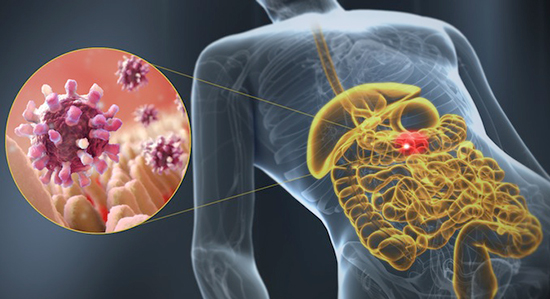Viral gastroenteritis is an intestinal viral infection characterized by nausea or vomiting, watery diarrhea, and fever.
Viral gastroenteritis, commonly known as stomach flu, is a highly contagious infection that affects the stomach and intestines. The disease is caused by various viruses, the most common of which is norovirus. This disease is easily spread through contaminated food, water, or close contact with an infected person. Symptoms usually include nausea, vomiting, diarrhea, abdominal pain, and sometimes fever. Although viral gastroenteritis can be unpleasant and interfere with daily life, it usually resolves on its own and resolves within a few days without any specific treatment. However, it is important to stay hydrated and practice good hygiene to prevent further spread of the infection.
Acute viral gastroenteritis is one of the most common reasons for emergency room visits (Urgencias Hospitalarias) and ambulatory emergency rooms (PAC) in Spain and other Mediterranean countries. Every year outbreaks of viral gastroenteritis often occur in closed, crowded spaces such as nursing homes, schools and cruise ships, and kindergartens. Restaurants are another common source of virus outbreaks.
The form of infection with viral gastroenteritis is contact with an infected person, or consumption of contaminated food and water. If you are healthy, you will most likely recover without complications within 48 hours. However, viral gastroenteritis can be dangerous for infants, the elderly, and people with suppressed immune systems. See Pediatrics and Rotavirus Vaccination.

What virus is the cause of intestinal disorder?
There are two main viruses that can cause gastroenteritis:
- norovirus/ Norovirus, the most common cause of foodborne illness worldwide, affects both children and adults. Norovirus infection can cause seasonal outbreaks of gastroenteritis. The transmission of this type of virus between people in confined spaces has been established. In most cases, you come into contact with the virus through contaminated food or water, although person-to-person transmission is also possible.
- Rotavirus / Rotavirus. Worldwide, it is the most common cause of viral gastroenteritis in children, who usually get the infection when they put their fingers or other objects contaminated with the virus into their mouths. Infection is more pronounced in infants and young children. Adults infected with rotavirus may not have any symptoms and, as carriers of the virus, may spread the disease to others without knowing it. In Spain, there is a vaccine for infants against viral gastroenteritis caused by rotavirus, which has proven clinically effective.
Some shellfish, especially raw or undercooked oysters, can also be contaminated with the virus. Although the primary source of viral diarrhea is contaminated water, in many cases the route of the virus is fecal-oral: that is, a person infected with the virus does not wash their hands after going to the bathroom and then manipulates the food you eat.
Surely many of you have ever watched programs about those unsanitary horrors that are happening in the kitchens of restaurants!
There is no effective treatment for viral gastroenteritis, so strict prevention is essential, and thoroughly washed hands are the best defense.
Diagnosis of gastroenteritis and symptoms of gastrointestinal viral infection
The diagnosis of gastroenteritis refers to the process of identifying and determining the presence of gastroenteritis, which is inflammation of the stomach and intestines. Diagnosis usually includes a comprehensive assessment of the patient's symptoms, medical history, and physical examination. In addition, laboratory tests may be done to confirm the diagnosis and rule out other possible causes.
These tests may include stool cultures to look for the specific pathogen responsible for the infection, blood tests to assess levels of dehydration and electrolyte imbalances, and imaging tests such as an abdominal x-ray or ultrasound to evaluate inflammation or potential complications. Ultimately, an accurate and timely diagnosis of gastroenteritis is critical to determining appropriate treatment and management strategies to relieve symptoms and speed recovery.
Viral gastroenteritis is commonly referred to as "stomach flu", however, gastroenteritis is not the same as influenza. The real flu only affects the respiratory system—nose, throat, and lungs. And viral gastroenteritis affects the intestines, causing symptoms such as:
- Watery diarrhea (almost always without blood - usually bloody diarrhea means you have a different and more serious infection)
- Intestinal colic and pain
- Nausea and vomiting
- Muscle aches or occasional headaches
- Increased body temperature (usually not higher than 37.5) in the first 12-24 hours
Symptoms of viral gastroenteritis can appear up to 24 hours after infection and are almost always mild clinical. Rarely is hospitalization required. Typically, symptoms last one to two days, but sometimes they can last up to 5 days.
Since the symptoms are quite specific and typical, it is difficult to confuse viral diarrhea with diarrhea caused by bacteria such as Clostridium difficile (Clostridium), Salmonella and Escherichia coli (E. coli) or parasites such as giardia (Giardia).
Differential diagnosis of viral gastroenteritis
The differential diagnosis of acute viral gastroenteritis includes other causes (infectious and non-infectious) of acute diarrhea. Diarrhea lasting more than a week in a person who has recently traveled, been camping, or had unsafe anal-oral sexual contact is caused by protozoa such as Giardia (giardia) and Cryptosporidium (cryptosporidium). Recent use of antibiotics or hospitalization may cause diarrhea, which will almost always be caused by Clostridium difficile.
Consideration should be given to common foodborne illnesses (e.g. Staphylococcus aureus), especially if the incubation period is 1-2 hours, which is not typical for viral diseases (i.e., within 8-16 hours). The presence of symptoms or signs of deterioration should prompt us to investigate further and establish an alternative diagnosis.
Basic principles of treatment of viral gastroenteritis at home
 Treatment for viral gastroenteritis involves a combination of rest, hydration, and symptom management. Because viral gastroenteritis is caused by a virus, antibiotics are not effective in treating the condition. The main goal of treatment is to relieve symptoms and prevent dehydration, as diarrhea and vomiting can lead to fluid loss. It is important to drink plenty of fluids, such as water, electrolyte solutions, or clear broths, to replace fluid loss and prevent dehydration.
Treatment for viral gastroenteritis involves a combination of rest, hydration, and symptom management. Because viral gastroenteritis is caused by a virus, antibiotics are not effective in treating the condition. The main goal of treatment is to relieve symptoms and prevent dehydration, as diarrhea and vomiting can lead to fluid loss. It is important to drink plenty of fluids, such as water, electrolyte solutions, or clear broths, to replace fluid loss and prevent dehydration.
Over-the-counter medications, such as diarrhea and anti-nausea medications, can help manage symptoms, but it's important to check with your doctor before taking any medication, especially for children or people with underlying medical conditions. Rest and avoiding solid foods for a short period of time can help the digestive system, allowing it to recover.
In severe cases, or if symptoms persist for more than a few days, medical attention should be sought to ensure proper treatment and prevent complications. Acute viral gastroenteritis is usually self-limiting and is treated with supportive measures (adequate fluids and unlimited food). There are no specific antiviral agents.
For adults with acute viral gastroenteritis without signs of dehydration, it is enough to support the body with sports drinks and broths. For adults who have signs of moderate hypovolemia (the initial stage of dehydration), rehydration solutions, which are sold in Spanish pharmacies, are very effective. Suero oral hiposodico.
Patients with severe dehydration require intravenous fluids (clinical presentation with vomiting and diarrhea for more than 48 hours).
Viral gastroenteritis does not require antibiotics. Antibiotics may play a critical role in the treatment of acute gastroenteritis when it is unclear whether the disease is viral or bacterial. The role of antibiotics in bacterial gastroenteritis is discussed separately in another article.
Tips for Treating Viral Gastroenteritis
Treating viral gastroenteritis can be challenging, but there are a few tips to help ease symptoms and speed up recovery. First of all, it is extremely important to stay hydrated by drinking plenty of fluids such as water, clear broths, and electrolyte-rich drinks. It helps to replace fluid loss from vomiting and diarrhea. In addition, practicing good hygiene by washing hands frequently, disinfecting surfaces, and avoiding close contact with other people can prevent the spread of the virus.
What can I eat and what are the dietary recommendations for urus gastroenteritis?
For adults with acute viral gastroenteritis, we do not recommend any restricted strict diet. However, it is advisable to exclude foods that are prone to rapid fermentation (cheese, milk, vegetables and fruits). We recommend cereals, potatoes, noodles, rice, wheat and oats.
Do probiotics help with viral gastroenteritis?
The fundamental importance of oral probiotics in viral viral gastroenteritis has not been established. Some help, others don't. There are no official studies, and there is no specific official recommendation for any type of probiotic, its dose and regimen.
Probiotics may modulate the immune response through interactions with the intestinal immune system or direct effects on other microorganisms. Numerous systematic reviews have shown a modest reduction in the duration of infectious diarrhea with the use of probiotics, although studies have been inconsistent.
Will a zinc supplement help with viral gastroenteritis?
Zinc. The effect of zinc supplementation on the duration of diarrheal disease in adults has not been studied, and its use is not a generally accepted standard. Zinc is recommended for children with acute diarrhea because diarrhea can cause zinc deficiency, resulting in increased duration and severity of symptoms. More suitable for developing countries.
Do diarrhea remedies help with viral gastroenteritis and can they be used?
Pharmacotherapy. We offer one and two day courses loperamide (4 mg orally and then 2 mg after each episode of diarrhea, up to 8 mg/day) as add-on treatment for supportive measures. Patients can take loperamide for no longer than two days. For adults over 65 years of age, loperamide is not recommended for self-medication and patients should be monitored closely. Loperamide for children is recommended from 1 mg per day.
Do I need to take antibiotics for viral gastroenteritis and will they help?
Antibiotics. For adults with viral gastroenteritis, I do not recommend the use of antibiotics. Empiric therapy for acute diarrhea of unknown origin may be helpful if you are a traveler, but does not appear to significantly change the course of the illness. If the patient's condition does not improve after seven days, then most likely the causative agent of the disease is not a virus.
When should you see a doctor for viral gastroenteritis?
 If you are an adult, see your doctor if:
If you are an adult, see your doctor if:
- If the period of diarrhea lasts more than 48 hours
- If you vomit for more than two days
- If you vomit blood or have bloody diarrhea or stools with a lot of green mucus
- If you are dehydrated - signs of dehydration - excessive thirst, dry mouth, dark yellow urine or if you stop passing urine during the day, there is severe weakness, dizziness
- If you have a fever above 40°C that does not go down with paracetamol
Recommendations for children, especially up to three years:
Call your doctor right away if your child has the following:
- If the temperature is up to 38.9 ° C or higher. Today, every family with a small child should have Ibuprofen and Paracetamol, which must be given to the child if he has a temperature in order to avoid febrile convulsions.
- The child is very lethargic or very irritable
- The child is constantly crying, has a lot of discomfort or severe stomach pain
- Your child has bloody diarrhea or vomiting
- He has signs of dehydration - you need to evaluate how much he drinks and how much urine he excretes.
Call your doctor right away if your baby is in the following situation:
- He vomits heavily for several hours
- He hasn't wet his diaper in six hours.
- Has bloody stools or large and frequent diarrhea
- He has a soft and recessed fontanelle (fontanella) at the top of his head.
- If he has a very dry mouth, or he cries without tears
- Extreme drowsiness or he doesn't respond in the usual way
Risk factors that are important to consider in gastroenteritis.
Gastroenteritis is present throughout the world and affects all people regardless of age, race or gender. People who may be more prone to gastroenteritis are:
- Small children. Children who are in institutions or who attend primary schools are especially vulnerable because a child's immune system takes time to develop.
- Aged people. The adult immune system tends to be less effective later in life. In particular, older people who are in nursing homes are more vulnerable because their immune systems are weakened and they live in close contact with other people who can transmit germs.
- School-age children; students who live in student hostels. Any place where groups of people gather indoors can be an excellent transmission medium for intestinal infections.
- Anyone with a weakened immune system. Especially greater risk if resistance to infections is low; for example, if your immune system is suppressed by HIV/AIDS, chemotherapy, or another disease.
- All gastrointestinal viruses are more active in a particular season of the year. For example, if you live in the northern hemisphere, you are more likely to get rotavirus or norovirus infections between October and April.
Complications of viral gastroenteritis
The main complication of viral gastroenteritis is dehydration, which is a severe loss of water, salts, and beneficial minerals. If you are healthy and drink enough fluids, then losses due to diarrhea and vomiting are minimal, and the risk of dehydration is also minimal.
Babies, the elderly, and people with suppressed immune systems can become severely dehydrated if they lose more fluid than they can make up. It may be necessary to replenish the fluid in the body intravenously. Dehydration can be fatal, but this rarely happens in European countries.
Prevention and control of outbreaks of viral gastroenteritis
The best way to prevent the spread of intestinal infections is to follow these simple precautions:
- Get your child vaccinated. Some countries, including Spain, have a vaccine against rotavirus gastroenteritis. The vaccine, given within the first month of life, has proven effective in preventing severe symptoms of this disease.
- Wash your hands thoroughly. And make sure your kids do it right too. Remember to wash around cuticles, under nails and between toes. Then rinse them thoroughly. Take wet wipes and disinfectants if soap and water are not available.
- If there is a person at home who has signs of gastroenteritis, then use kitchen utensils separately. Use separate towels in the bathroom.
- Keep your distance. If possible, avoid close contact with people who have the virus.
- Disinfect surfaces. If someone in your home has viral gastroenteritis, disinfect hard surfaces like countertops, faucets, and doorknobs.
Take precautions when traveling to other countries:
When you travel to other countries, you can get sick from eating contaminated local food or water. You can reduce your risks by following these tips:
- Drink only bottled water or sealed soda water.
- Avoid ice cubes as they can be made with contaminated water.
- Use bottled water to brush your teeth.
- Avoid raw foods (such as peeled fruits, raw vegetables, and salads).
- Avoid meat and fish that are not fully cooked.
Many thanks to the author of the article for the information about viral gastroenteritis and its symptoms. Are there antiviral drugs that can help treat viral gastroenteritis?
From experience I can say that there are no antiviral drugs. I tried drinking cola and it helped me a lot.